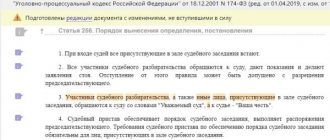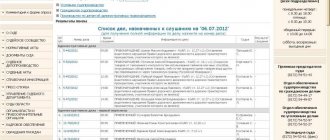The Civil Procedure Code of the Russian Federation does not directly name a request for a mobile court hearing as a basis for considering a case outside the court premises. In contrast to the Arbitration Procedural Code of the Russian Federation, the procedures for considering criminal cases. The Code of Civil Procedure of the Russian Federation provides for only one opportunity to hold a court hearing in civil cases outside the court - to examine evidence at its location.
Not every piece of evidence in a civil case can be examined on the court premises. Therefore, in such cases, a party to the case can prepare a petition for an on-site court hearing. We’ll tell you how to do this below. Additional questions can be asked to the site’s duty lawyer.
:
Request for a mobile court hearing
How does a court hearing in a civil case work?
A court hearing (SH) is a proceeding conducted in strict compliance with the rules of the Code of Civil Procedure of the Russian Federation in order to resolve disputes between the parties. By law, the parties to the proceedings are considered to be the plaintiff and the defendant. They can protect their interests independently or through legal representatives by proxy.
There can be several participants:
for example, when a plaintiff files a lawsuit against several defendants, or, conversely, a class action lawsuit is filed against one.
First, the case is prepared after the claim is accepted. The parties are invited to a conversation to clarify the circumstances or request additional documents. A preliminary court hearing may be scheduled to request evidence and other materials. Based on the results, a decision is made to assign the case to trial.
Let's look at the next steps in detail.
Opening of the court session
The presiding officer opens the court order, asks the secretary about the attendance of the participants and notification of all persons about the date of the hearing. If any of them is absent, the reasons for non-appearance are clarified.
Next, the composition of the court is announced: Full name. judge, secretary, prosecutor, expert, specialist, translator, participants or their representatives. The reason for the proceedings is explained.
Consideration of the case on the merits
This is the longest part. It all starts with the report of the judge or presiding judge. The opinions of the parties and third parties are heard. The sequence of studying the evidence is established.
What happens during this time:
- At the end of the report, the judge proposes to enter into a settlement agreement. Having agreed to this, the proceedings on the case are terminated and an appropriate ruling is made.
- Witnesses are questioned and expert opinions are examined.
- Stakeholders present their positions. If among the participants there are representatives of the prosecutor’s office or another government agency, they are given the floor first.
- Evidence is studied and presented to interested parties for review.
At the end, the prosecutor or other authorized person gives an opinion on the case.
Interrogation of witnesses
Witnesses are interviewed separately. Before the start of the interrogation, the court reminds of the responsibility for giving knowingly false testimony.
During the interview, the judge finds out their connection and relationship with the participants in the proceedings, as well as relevant circumstances. After the interrogation, the witness remains in the room.
New witnesses are not present at the hearing and are invited separately to exclude the possibility of their communication with those already interviewed.
Note! If a witness has given written testimony in advance but is absent at the hearing, that testimony will be read out. They are equated to evidence (Article 181 of the Code of Civil Procedure of the Russian Federation).
Examination of evidence
The procedure for examining evidence is determined after hearing the opinions of the parties. During the consideration, evidence is presented to the participants in the proceedings.
The inspection protocols drawn up at the location of the material evidence are announced. After the announcement, the participants have the right to give explanations (Article 183 of the Code of Civil Procedure of the Russian Federation).
In conclusion, the prosecutor or other authorized representative of the government agency gives a conclusion. The judge proposes to supplement the case materials. Subsequently, after studying the evidence, expert opinion, specialist consultations and questioning of witnesses, the court proceeds to the debate.
Expert opinion research
If an examination was appointed for the proceedings, the conclusion is examined on the SZ (Article 187 of the Code of Civil Procedure of the Russian Federation). The document is read out by the presiding officer in the absence of an expert.
If he is present at the hearing, the announcement of the conclusion rests with him. After this, interested parties have the right to ask him questions.
Specialist consultations
At the request of the parties or a court ruling, specialists are involved in the study of material or written evidence, the study of video and audio recordings.
The specialist provides technical assistance and advises on specific issues. Explanations are given orally or in writing and are attached to the case file (Article 188 of the Code of Civil Procedure of the Russian Federation).
Judicial debate
The participants or their representatives speak in the debate. The plaintiff is heard first, then the defendant.
After the hearing, they are given the right to make remarks; the defendant speaks last (Article 190 of the Code of Civil Procedure of the Russian Federation).
If the prosecutor is involved in the case, the first word is given to him.
Legal advice: during debates, be sure to justify your words with references to legislative norms. It is necessary to address the court, and not the participants in the process, and use the evidence already presented and examined to your advantage.
Decision-making
The court goes to the deliberation room to make a decision. After this, the presiding officer returns to the hall and announces it.
According to Art. 214 of the Code of Civil Procedure of the Russian Federation, copies of decisions are issued to the parties to the proceedings no later than 5 days from the date of issue. If the plaintiff or defendant did not appear at the last court hearing, copies are sent by registered mail with return receipt requested no later than 5 days from the date of acceptance.
If the document is drawn up in electronic form, with the permission of the participants it is published on the official website without making personal data public.
How long does the meeting last?
The duration can range from 5 minutes to several hours.
It all depends on the following circumstances:
- number of participants;
- involvement of experts or other persons;
- the defendant’s agreement or disagreement with the claims;
- complexity of the case;
- number of motions and objections.
On average, the main meeting takes 1-2 hours.
If we are talking about the total duration of legal proceedings, then everything depends on the specific case. The total review period is 2 months.
Disputes regarding the collection of alimony, reinstatement at work, challenging decisions of municipal authorities on the demolition of unauthorized buildings are considered within 1 month.
When using simplified proceedings, proceedings take up to 1 month; in special proceedings, cases can be considered in 5 days.
How is the protocol drawn up?
The secretary must keep a protocol reflecting all remarks during the hearing. If the secretary does not have time to reflect all the circumstances in the document, he uses an audio recording after the SZ and makes adjustments.
The minutes are signed by the secretary and the presiding officer. In some cases it is conducted by an assistant judge. The document is also given to production participants for review. If they are not satisfied with the content, they submit comments within 5 days after studying.
The consideration of comments is carried out by the judge who signed the protocol. To do this, he is given 5 days from the date of the appeal of the participants in the proceedings.
Closed court hearing in civil proceedings
According to Art. 10 of the Code of Civil Procedure of the Russian Federation, court hearings are open. However, in some cases closed meetings are held.
A closed court hearing in a civil trial means that only participants in the process can be present at such a hearing; no other outsiders can be in the courtroom.
Cases on certain categories of cases are held in closed sessions, for example, cases related to state secrets, adoption cases, etc., and the court can decide to hold a closed session at the request of a participant in the process, for example, in order to preserve trade secrets, inviolability of private life and in other cases.
The secrecy of such processes is required so that some secret is not disclosed, so that the public does not find out about it. That is, there is a secret of adoption, information about such cases is not in the public domain and so that this does not become known to an indefinite circle of people, the legislation provides for the secrecy of such processes.
Who is participating in the meeting?
Each participant is assigned separate roles. Let's consider who is invited and why, what rights and responsibilities they have.
Plaintiff
A plaintiff is a citizen or legal entity whose rights have been violated. On his initiative, proceedings are initiated after the statement of claim is accepted.
During the proceedings, the plaintiff is entitled to:
- get acquainted with the case materials, make extracts;
- ask questions to other participants, witnesses, specialists and experts;
- challenge the judge, secretary, translator, expert;
- file motions and objections;
- give oral and written explanations;
- object to the arguments and motions of other participants;
- express your opinion on the issue under consideration.
Also, during the proceedings, the plaintiff has the right to change the claims, the subject of the claim, increase or decrease the claims, abandon the claim, and enter into a settlement agreement with the defendant.
Defendant
During the proceedings, he is granted the same rights as the plaintiff.
Additionally he can:
- file objections to the claim;
- fully or partially recognize the plaintiff’s claims;
- give explanations;
- submit petitions;
- present evidence in your favor.
The parties have the right to protect their interests through third parties - lawyers. For this you will need a power of attorney. With the participation of defenders, the attendance of the participants is optional (Article 48 of the Code of Civil Procedure of the Russian Federation). Personal participation does not deprive the defendant and plaintiff of having the support of lawyers.
Translator
An interpreter is appointed at the request of a person who does not speak Russian. At the beginning of the court session, the judge explains his rights and obligations when translating explanations and testimony.
To clarify, he can ask the parties questions, as well as get acquainted with the protocol and make comments regarding the correctness of the translation.
Important! Other participants in the proceedings - plaintiffs, defendants, representatives - may not be translators, even if they have the necessary skills and knowledge in the field of foreign languages. This is always only an individual person who does not act as another participant.
Witnesses
According to Art. 70 of the Code of Civil Procedure of the Russian Federation, a citizen summoned as a witness is obliged to appear at the hearing at the appointed time to give truthful testimony. If he cannot come due to illness or other valid reasons, the interrogation is carried out at his place of residence.
Witnesses are guaranteed the right to reimbursement of expenses for wasting their time to attend court, as well as compensation for expenses for other needs related to the proceedings.
The procedure and amount of compensation are established by Decree of the Government of the Russian Federation dated December 1, 2012 No. 1240.
Prosecutor's office
According to Art. 45 of the Code of Civil Procedure of the Russian Federation, the prosecutor participates in proceedings to protect the rights and interests of citizens, and in some cases is involved in considering cases of:
- reinstatement at work;
- eviction;
- compensation for harm to life and health;
- adoption;
- forced hospitalization of a citizen;
- establishing incapacity;
- recognition of a person as dead or missing.
During the court hearing, the prosecutor involved in the cases gives an opinion. If he is the applicant, he is entitled to the same rights as the plaintiff.
Child protection
Representatives of guardianship authorities are involved in cases of protecting the interests of children.
They give an opinion on the possibility of adoption, determining the child’s place of residence with one of the parents, deprivation of parental rights, etc.
The guardianship authority is not a party to the proceedings; it acts as a separate government agency.
Experts
When an examination is scheduled, an expert is invited to provide explanations on the conclusion.
The expert can:
- ask to become familiar with the case materials;
- request additional materials for research;
- ask questions to other participants.
The expert also has the right to apply for the involvement of other specialists (Article 85 of the Code of Civil Procedure of the Russian Federation).
Replacing the composition of the court “according to the Civil Procedure Code”: a gap that has become the nature of the process
Now only the Code of Civil Procedure of the Russian Federation, in contrast to the Arbitration Procedure Code of the Russian Federation, the Code of Criminal Procedure of the Russian Federation and the CAS of the Russian Federation (of all “purely” procedural codes, i.e. we do not take into account the Code of Administrative Offenses of the Russian Federation), does not regulate the issue of replacing the composition of the court in a manner that would correspond to the main idea of Part 1 of Art. 47 of the Constitution of the Russian Federation, which, by its substantive meaning, guaranteed the personal immutability of the judicial composition back in 1993. And even the so-called “procedural revolution” of 2018-2019, which introduced into the Code of Civil Procedure of the Russian Federation new procedural rules on the consideration of civil cases in appellate and cassation courts of general jurisdiction, the mandatory presence of a higher legal education for a representative accompanying the case in a regional (equal) and higher court, mandatory audio recording and other innovations, did not eliminate the obvious practical gap of the “long-suffering” code - the Code of Civil Procedure of the Russian Federation still does not know the imperative norm that the consideration of a case begun by a certain composition of the court must be completed by it.
In our opinion, this gap is not just a gap - from a purely practical point of view, it is a callous and vile obstacle for an active participant in the case, vigorously defending the correctness of his legal position in the appellate court (in particular).
It has already become an objective truth that in the Moscow City Court, cases going through the appeal stage are considered not only in the list of “70-80 cases per day for one composition of the court in one room,” but also during several hearings on the case by different compositions of the court, Moreover, the persons of these compositions often change by 100%. The question arises: does this affect the quality of the consideration of the case, the hearing and assessment of the positions of the parties involved in this case, or is this phenomenon absolutely incapable of leading to an incorrect appellate ruling? Each colleague will answer this question in his own way, taking into account his own experience of working on cases in the Moscow City Court.
I dare to announce something from the practice of my participation in such enterprises. A very complex civil case for the recovery of unjust enrichment, coupled with the investigation of another complex case in scope and subject matter and poorly considered by one of the district courts of Moscow following an 8-month hearing, ended up in the Moscow City Court, where the first meeting was held by judges P., I. and M.
Our side was so determined to convey the shortcomings of the trial court and to direct the appellate court to make a decision on the case in a certain form, that the attitude towards the meeting in the person of the judiciary of adequacy, literacy and attentiveness acquired a fixed idea.
On August 12, 2019, during the hearing of the parties’ arguments, the court composition of P., I. and M. showed unprecedented attentiveness, immediately assessing the degree of complexity of the case and letting the participants in the process understand that the duration of its hearing will determine the quality of the consideration of this case and, as a result, the legality , validity and fairness of the court decision adopted in the appeal. At the end of the hearing, two judges from P. and I. even commented on the arguments of the appellant parties (the decision in the case was appealed by two disputing parties at the same time), from which it followed that the court was determined to take an extremely clear approach to resolving controversial issues.
Having received a boost of confidence and joy in the adequacy of the judicial composition, my client’s side carefully prepared for the next meeting in the case, practicing the arguments already voiced and strengthening its position. Knowing that the hearing on the case was scheduled for the morning of September 12, 2019, the first on the entire list for that day, my client and I gratefully appreciated the gift of fate.
But the morning of September 12, 2019 began to develop completely differently from the scenario that was expected by us and, perhaps, by the composition of the court. Having discovered that our case would be heard in another room and by a different composition of the court (E., K. and O.), the state of stable confidence instantly disappeared.
Having habitually reported the circumstances of the case based on his materials, presiding officer E. spared no time in asking questions to the parties and, to put it mildly, organized a quick questioning on the facts of the case right at the court hearing. From the nature of the questions and the accents of the presiding officer, one thing followed: the composition of the court is not oriented in the materials of the case, even despite their perfect formal report... Result: “the decision of the court of first instance is left unchanged.” No comments needed.
The apparently arbitrary replacement of the composition of the court that took place in this case, which was previously not so painfully perceived due to the lower significance (than the indicated case) of the cases being considered in our Moscow City Court, overnight radically changed the lives of the parties to this case, becoming for them a bomb exploding that no one waited.
And only on December 3, 2019, the Second Court of Cassation overturned the appeal ruling of September 12, 2019, indicating significant violations of the norms of procedural law by the courts of first and appellate instances in the case. However, the cassation court did not check the arbitrary replacement of the composition of the court (in the interests of legality as a whole).
In this way, the Code of Civil Procedure of the Russian Federation, with the absence in its content of an imperative rule that “the consideration of a case begun by a certain composition of the court must be completed by it,” played a cruel joke in the fate of the parties to the dispute.
Convention for the Protection of Human Rights and Fundamental Freedoms of 1950 in paragraph 1 of Art. Article 6 states that everyone, in the event of a dispute regarding his rights and obligations, has the right to a fair and public hearing within a reasonable time by an independent and impartial tribunal established by law. The principle of independence and impartiality of the court must be ensured, among other things, by the procedure for forming the composition of the court, including the grounds and procedure for replacing judges.
At first glance, it seems that these things are overly theorized and far from the judicial life of Russia, but it seems so until you see with your own eyes the enormity of the failure to implement this principle in practice, especially in the example of disputes like the one I told.
Failure to comply with the condition of the unchanged composition of the court is one of the significant violations of the rules of civil, arbitration and criminal proceedings, entailing the cancellation of judicial acts by a higher court. But again, this phenomenon is typical only for the Arbitration Procedure Code of the Russian Federation, the CAS RF and the Code of Criminal Procedure of the Russian Federation. The legislator probably decided to joke about the Code of Civil Procedure of the Russian Federation.
According to the Arbitration Procedure Code of the Russian Federation, a case the consideration of which was initiated by one judge or court panel must be considered by the same judge or court panel (Part 2 of Article 18). The same is provided for in clause 37 of the Rules of Arbitration Courts, approved by Resolution of the Plenum of the Supreme Arbitration Court of the Russian Federation dated 06/05/1996 No. 7. The Arbitration Procedure Code of the Russian Federation allows for the replacement of the composition of the court, not related to the challenge or self-recusal of a judge or one of the judges or the termination or suspension of their powers, only in case of a long absence of a judge due to illness, vacation, or study (clause 2, part 3, article 18). The replacement of the composition of the arbitration court in these cases is caused by the objective impossibility (due to the temporary absence of the judge) or practical inexpediency (due to the long delay in resolving the dispute) of considering the case by the original composition of the court.
The Code of Criminal Procedure of the Russian Federation, along with the Arbitration Procedure Code of the Russian Federation, also allows for the replacement of the composition of the court only if one of the judges is unable to continue to participate in the court hearing (Part 2 of Article 242).
And CAS of the Russian Federation in Part 2 of Art. 28 proclaims that an administrative case, the consideration of which was initiated by one judge or court panel, must be considered by the same judge or the same court panel.
Meanwhile, the Code of Civil Procedure of the Russian Federation, unlike the Arbitration Procedure Code of the Russian Federation, the CAS RF and the Code of Criminal Procedure of the Russian Federation, does not contain specific grounds on which the composition of the court may change, not related to the challenge, self-recusal of a judge or termination or suspension of his powers, and therefore, in the opinion of practitioners and legal theorists, actually allows for arbitrary replacement of the composition of the court, which, in fact, happened in the illustrated case. And it would be easier if there was only one case, but contrary to common sense, there are dozens, or even hundreds, of such incidents in the practice of the Moscow City Court.
At the same time, Part 2 of Art. 157 of the Code of Civil Procedure of the Russian Federation determines that “the hearing of the case takes place orally and with the same composition of judges.” And further stipulates: “if one of the judges is replaced during the consideration of the case, the proceedings must be carried out from the very beginning.” However, again, the code does not provide for a procedure for replacing a judge, does not directly answer the question of whether it is possible to change one judge or the entire composition, and unconvincingly conveys its meaning to the reader, creating even greater misunderstanding in his head.
It remains to cling to this expression, prescribed in Part 2 of Article 157 of the Code of Civil Procedure of the Russian Federation: “the trial of the case takes place with an unchanged composition of judges,” but it does not find support from the courts, even despite the fact that it represents a discreet rule of law.
As Savin K.G. writes, “at present, in courts of general jurisdiction in civil cases, a practice has been formed according to which replacing the composition of the court does not require the execution of any procedural document by an authorized official (chairman, deputy chairman of the court, chairman of the court panel ) and placing it in the case materials. Therefore, the absence in the case materials of a procedural document on replacing the composition of the court does not indicate the illegality of the composition of the court that made the decision, and therefore does not affect the legality of the decision itself” (for example: rulings of the Perm Regional Court dated April 2, 2012 in case No. 33-2644 /2012, dated 04.04.2011 in case No. 33-3156/2011; ruling of the Tomsk Regional Court dated 10.01.2012 in case No. 33-47/2012; ruling of the Saratov Regional Court dated 04.07.2012 in case No. 33-3733/2012).
He also notes that “there is numerous practice of the same courts, according to which the replacement of the composition of the court should not be justified by any valid reasons. The courts, which check the legality and validity of judicial decisions or only their legality, do not at all analyze the validity of the reasons for replacing the composition of the court and the possibility of considering the case by the original composition of the court, pointing out only that the norms of civil procedural legislation do not determine the range of grounds on which the replacement of a judge is possible "(rulings of the St. Petersburg City Court dated March 26, 2012 in case No. 33-3495/2012, dated July 25, 2012 in case No. 33-10197/2012, dated June 18, 2012 in case No. 33-7937 /2012; ruling of the Vologda Regional Court dated March 30, 2012 in case No. 33-1053/2012; ruling of the Voronezh Regional Court dated July 24, 2012 in case No. 33-3856/2012).
Only one exception was found by the author Savin K.G., after conducting a labor-intensive analysis of court practice on this issue - the theoretical reasoning of the Saratov Regional Court, set out in the ruling dated October 3, 2012 in case No. 33-5761/2012, considered that “replacement of judges is an exception to the rule about the unchanged composition of the court and is allowed only if there are good reasons (in case of recusal, illness, being on a business trip, removal from work in accordance with the procedure established by law, etc.) ... ". There are no more such positions.
It would seem that the composition of the court in the case has completely changed, and what to anger the Lord, the procedures, although formally, adhered to: the meeting was opened, the case was reported, the parties were interviewed... It is on these arguments that many regional (equal) courts “leave” - they say : once the procedure has been followed, the protocol states that the case was reported, the parties were heard, then we must assume that the case was considered by the new composition of the court “from the very beginning,” as it should be (ruling of the St. Petersburg City Court dated October 29, 2012 in the case No. 33-14165/2012, ruling of the Vologda Regional Court dated October 12, 2012 in case No. 33-4166/2012, ruling of the Moscow City Court dated September 26, 2012 in case No. 4g/9-5349/2012). Well, yes... (the author has deep doubts). But why then are prohibitions on such things provided for by the “relatives” of the Code of Civil Procedure - the Arbitration Procedure Code of the Russian Federation, the CAS of the Russian Federation and the Code of Criminal Procedure of the Russian Federation, just like that?!
Even with the “pallor” of Part 2 of Art. 157 of the Code of Civil Procedure of the Russian Federation, which establishes the immutability of the composition of the court, the conclusion about the impermissibility of arbitrary replacement of the composition of the court does not evaporate anywhere - the regulatory meaning of Part 3 of Art. 14 of the Code of Civil Procedure of the Russian Federation (as amended on July 29, 2018) nevertheless presupposes that the composition of the court should be formed once to consider each case.
In addition, we forget that Part 1 of Art. 47 of the Constitution of the Russian Federation guarantees us: “no one can be deprived of the right to have his case considered in the court and by the judge to whose jurisdiction it is assigned by law.” Given the paucity of regulatory capabilities of the Code of Civil Procedure of the Russian Federation, this norm can be applied by the court in a specific case due to its direct effect (clause 2 of the Resolution of the Plenum of the Supreme Court of the Russian Federation of October 31, 1995 No. 8 “On some issues of the application by courts of the Constitution of the Russian Federation in the administration of justice”) .
Once, the Constitutional Court of the Russian Federation, in its ruling dated April 3, 2014 No. 656-O, explained that “established in Part 2 of Art. 18 of the Arbitration Procedure Code of the Russian Federation, the procedure for replacing a judge serves as a guarantee against the arbitrary transfer of a case from one judge to another judge of the same court or against the arbitrary replacement of judges during a collegial hearing of a case. If a replacement in the composition of the court considering the case is made without the presence of grounds established by procedural law, then the composition of the court formed in this way must be recognized as formed in violation of Art. 18 of the Arbitration Procedure Code of the Russian Federation, i.e. illegal, which in any case entails the cancellation of the judicial act adopted by him (clause 1, part 4, article 270 and clause 1, part 4, article 288 of the Arbitration Procedure Code of the Russian Federation).” A similar position was held by the Presidium of the Supreme Arbitration Court of the Russian Federation in decisions dated July 17, 2012 in case No. A56-6180/2011, dated June 18, 2013 in case No. A40-108801/2011 and dated October 15, 2013 in case No. A10-3798/2012.
The logic of the prohibition of arbitrary replacement of the composition of the court in the Arbitration Procedure Code of the Russian Federation, the CAS of the Russian Federation and the Code of Criminal Procedure of the Russian Federation, the logic of the position of the Constitutional Court of Russia is clear as day - changing the composition will simply lead to arbitrariness or poor-quality consideration of the case, so it should be prohibited. It was the second case that appeared in the case of my client, and, moreover, it is not so safe - the fates of both sides are crippled... One thing is unclear - if the legislator “crumbs” the Code of Civil Procedure so much, declaring a “procedural revolution,” then why is he missing the obvious thing?! Mystery…
In the meantime... for now it seems possible to use Part 2 of Art. 157 of the Code of Civil Procedure of the Russian Federation in systemic connection with Part 2 of Art. 47 of the Constitution of the Russian Federation, which has the property of direct action, which in its general meaning prohibits arbitrary changes in the composition of the court when considering a specific case. No matter how the courts and other overly experienced legal practitioners mock, the attention of the courts to the provisions of Part 2 of Art. 47 of the Constitution of the Russian Federation should still be “poked”, otherwise participants in civil proceedings will not have to hope for a legal, objective and exhaustive consideration of their cases by a trained court panel.
Will there be anything else with this Civil Procedure Code...






